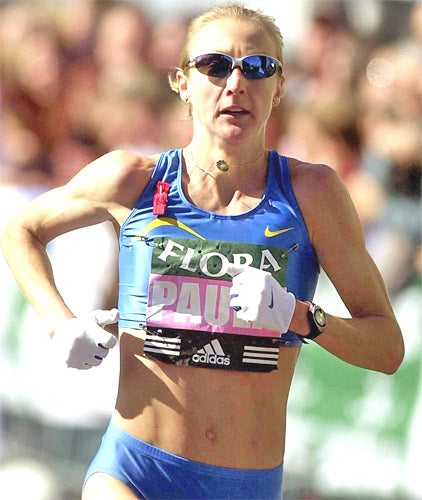The Week in Radio: A sports commentary that goes the distance

It's a fact unwisely overlooked by all those people gearing up to run Sunday's marathon that as Phidippides, the first marathon runner, hit the final ribbon in Athens he promptly dropped dead. It doesn't stop thousands doing the marathon of course, or indeed banging on about it afterwards, so it's a relief to discover that there is actually an interesting subject to talk about in the world of running. As explored in The Sub-Two-Hour Marathon: Sport's Holy Grail, it's the race to beat the current record of two hours, three minutes and 59 seconds.
A lot of sports commentary on radio consists of people being gobsmacked at sporting achievements, and Chris Dennis's breathless amazement at marathon runners was no exception. "The mind boggles!" he gasped as he slogged along on the treadmill, attempting to match the speed of the elite. But this being Radio 4 there was also a compulsion to do what shampoo adverts call "the science bit". Thus, Dr Barry Fudge from Loughborough University was brought on to explain the three variables that determine how fast you can run: "There's the VO2 max, that's your maximal rate of energy expenditure, your running economy and then your fractional utilisation of VO2 max." Now I would actually have liked this translated into English, but there was no time for that because we were off to East Africa, where the first sub-two-hour runner – or S2H as boffins might say – is probably located. "Is there something genetically specific to people from East Africa?" asked Dennis in the sort of question that is generally off limits at the BBC. But it turns out that there is, and it's a combination of high altitude, good weather and height.
Yet as we runners know, there is only so much you can say about running. Or as Paula Radcliffe opined: "You're not thinking, you're just running." Talking about sport, despite the fact that there's an entire radio channel devoted to it, can sometimes be a challenge. Even Julian Lloyd Webber, in a beguiling interview by Nick Ferrari on Classic FM, tried hard to elaborate on his obsession with Leyton Orient. He used to go along with the formidable pianist John Lill, the Lloyd Webbers' lodger, an image that made my own mind boggle. Now he attends regularly. "It's just such a different atmosphere from the concert hall," he explained, with masterly understatement. "There's no easy link from Leyton Orient to Delius," worried Nick. "Except he's scandalously out of fashion," said Julian, helpfully. As an affectionate salute for Lloyd Webber's 60th birthday, and full of his favourite work, this was utterly enjoyable and by far the most restful programme by Nick Ferrari I have ever heard.
After which it was a wake-up call to listen to Voodoo Wasps and Zombie Worms, a sheerly terrifying programme about the most successful parasite on Earth and its incredible effect on human behaviour. Up to a third of the human race is currently infected by toxoplasma gondii – hosted by cats and present in raw meat, contaminated soil and unwashed vegetables. In rats, the parasite intentionally changes behaviour to make them lose their fear of cats, and thus get eaten. But it has astonishing effects on human behaviour too, increasing risk taking and hyper activity. It's probably because the parasite affects dopamine, the neuro-modulator associated with anxiety. Tests show that men infected are more likely to behave in a reckless fashion, have car crashes and skip red lights. Curiously, women are affected in a different way, becoming more warm-hearted and easy-going. This riveting subject was the stuff of airport thrillers, but as presented by journalist and biologist Frank Swain it was also a textbook example of how to do science on radio. Boffin-free, clearly explained, easy to follow, and as they say, simply mind-boggling in its implications.
Subscribe to Independent Premium to bookmark this article
Want to bookmark your favourite articles and stories to read or reference later? Start your Independent Premium subscription today.

Join our commenting forum
Join thought-provoking conversations, follow other Independent readers and see their replies